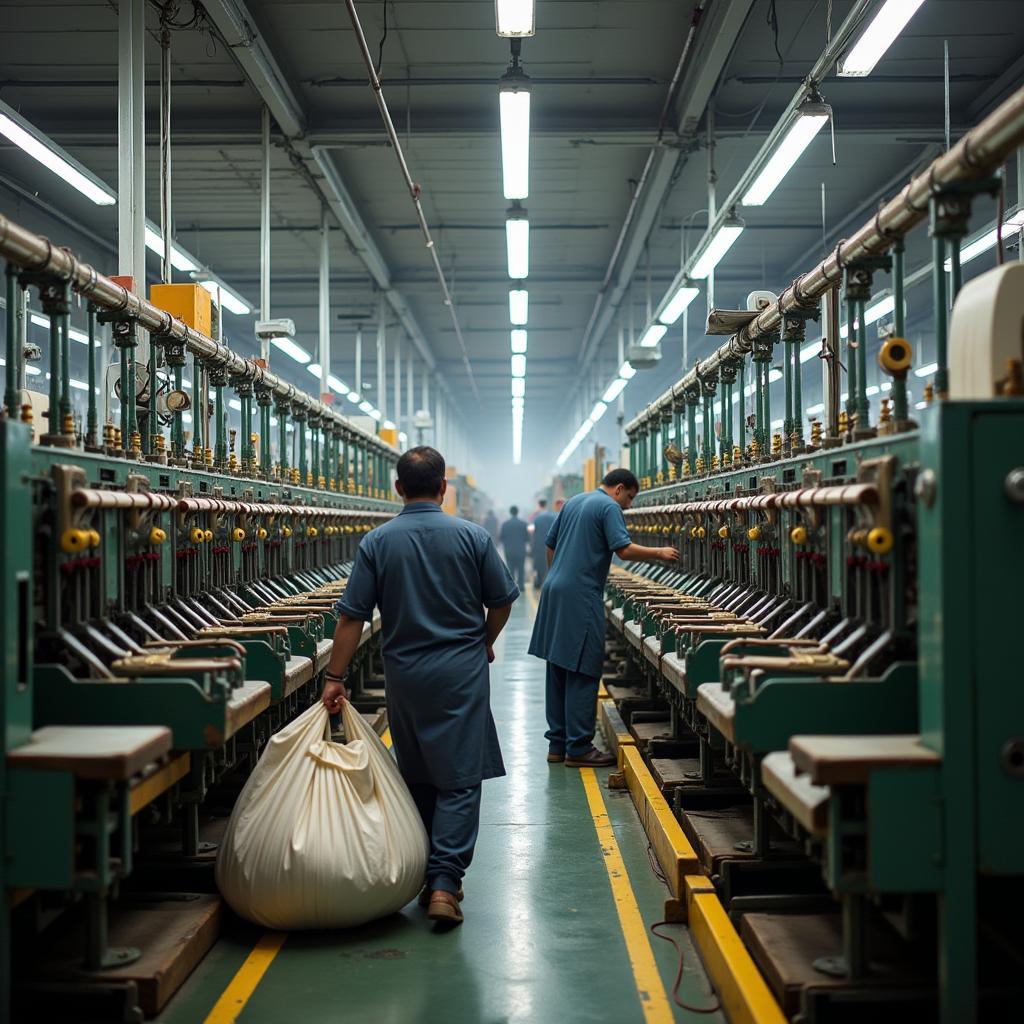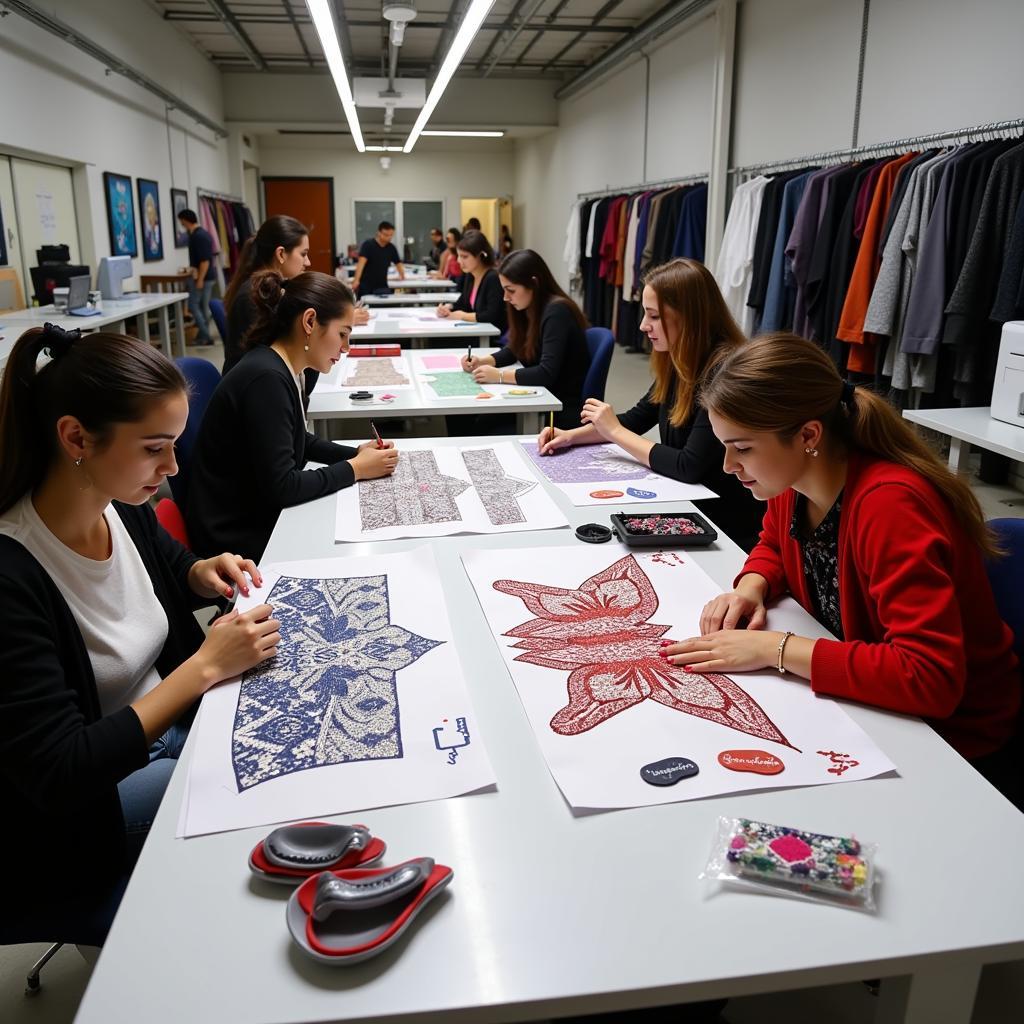The Cotton Textile Industry In Pakistan stands as a cornerstone of the national economy, deeply intertwined with its history, agriculture, and global trade. From the fields of Punjab to the bustling factories of Faisalabad, cotton’s journey into textiles embodies a legacy of craftsmanship and industrial significance.
A Legacy Woven in Cotton: Historical Significance and Economic Impact
Pakistan’s tryst with cotton dates back centuries, with evidence pointing towards its use during the Indus Valley Civilization. This long-standing relationship flourished under British rule, establishing a robust textile industry that laid the foundation for Pakistan’s economic landscape after independence. Today, the cotton textile industry remains a dominant force, contributing significantly to Pakistan’s GDP, export earnings, and employment opportunities.
The industry’s impact extends far beyond mere numbers. It is deeply interwoven with rural livelihoods, with millions depending on cotton farming for their sustenance. Moreover, the textile sector, with its vast network of spinning, weaving, dyeing, and garment manufacturing units, provides employment to a significant portion of the population, particularly women.
Navigating a Complex Terrain: Challenges Facing the Industry
Despite its historical significance and economic contributions, the cotton textile industry in Pakistan faces a myriad of challenges in the 21st century. These challenges are multifaceted, ranging from issues within the agricultural sector to global market dynamics and technological advancements.
From Seed to Thread: Challenges in Cotton Production
One of the most pressing concerns is the decline in cotton production within Pakistan. Factors such as climate change, pest attacks, and outdated farming practices have contributed to fluctuating yields and quality concerns. This directly impacts the textile industry, which relies heavily on a steady and high-quality supply of raw cotton.  Pakistani Textile Factory Interior
Pakistani Textile Factory Interior
Staying Afloat in a Competitive Global Market
In the global arena, the Pakistani cotton textile industry faces stiff competition from countries like China, India, and Bangladesh, all vying for a share of the international textile and apparel market. This competition highlights the need for Pakistan to enhance its competitiveness by focusing on factors such as product quality, value addition, and efficient production processes.
Embracing Modernity: The Need for Technological Upgradation
Furthermore, the rapid pace of technological advancements in textile manufacturing necessitates continuous upgradation and innovation. Adopting modern machinery, automation, and sustainable production practices are crucial for the Pakistani industry to remain competitive and cater to the evolving demands of global buyers.
Weaving a Brighter Future: Opportunities for Growth and Sustainability
Despite these challenges, the cotton textile industry in Pakistan possesses immense potential for growth and development. By addressing the existing hurdles and capitalizing on emerging opportunities, the industry can regain its lost glory and contribute even more significantly to the nation’s economic prosperity.
Enhancing Cotton Production: Investing in Research and Development
One of the key areas of focus should be on improving cotton production within the country. This requires a multi-pronged approach, including investing in research and development of high-yielding, pest-resistant cotton varieties. Additionally, promoting modern farming techniques, providing adequate financial support to farmers, and ensuring efficient water management are crucial steps towards revitalizing cotton farming.
Moving Up the Value Chain: Focusing on Product Diversification and Value Addition
To thrive in the competitive global market, Pakistan needs to move beyond producing basic textiles and focus on product diversification and value addition. This involves investing in design capabilities, developing high-end garments, and exploring niche markets such as organic cotton and sustainable textiles.  Pakistani Fashion Design Studio
Pakistani Fashion Design Studio
Embracing Sustainability: The Way Forward for the Textile Industry
Sustainability is no longer an option but a necessity for the textile industry worldwide. Pakistan can gain a competitive edge by adopting environmentally friendly production processes, reducing water consumption, and minimizing waste generation. This shift towards sustainable practices aligns with the growing global demand for eco-conscious fashion and can open doors to new markets and premium pricing.
Conclusion: Securing a Sustainable Future for Pakistan’s Textile Legacy
The cotton textile industry in Pakistan stands at a critical juncture, facing both challenges and opportunities. By addressing issues related to cotton production, embracing technological advancements, and focusing on value addition and sustainability, the industry can chart a path towards sustained growth and contribute significantly to Pakistan’s economic development. The journey from “seed to thread” to the global marketplace requires a collective effort from stakeholders across the value chain, ensuring that Pakistan’s textile legacy continues to thrive for generations to come.
FAQs
What is the current state of the cotton textile industry in Pakistan?
The cotton textile industry in Pakistan faces challenges like declining cotton production and global competition, but opportunities exist in enhancing production, focusing on value addition, and embracing sustainability.
What are the major challenges faced by the Pakistani textile industry?
The industry faces challenges such as declining cotton production, increasing input costs, a shortage of skilled labor, energy shortages, and fierce competition in the global market.
What measures can be taken to improve the competitiveness of the Pakistani textile industry?
Measures such as upgrading technology, improving infrastructure, promoting innovation, and focusing on skill development can enhance the competitiveness of the Pakistani textile industry.
What is the role of the government in supporting the textile industry?
The government plays a crucial role in providing a conducive business environment, offering incentives for export-oriented industries, and investing in research and development to support the textile sector.
What are the future prospects of the cotton textile industry in Pakistan?
The future prospects of the industry remain positive due to the rising global demand for textiles. However, addressing challenges related to productivity, quality, and sustainability is crucial for long-term growth.
Find Out More
For further insights into the Pakistani textile industry, explore our articles on:
- Pakistan Mens Designer
- Wide Leg Pants Pakistan
- Comforter Sets Pakistan
- List of Textile Industry in Pakistan
- Pakistan Wholesale Clothing
Get in touch with us at +923337849799, [email protected], or visit our office at Dera Ghazi Khan Rd, Rakhni, Barkhan, Balochistan, Pakistan. Our customer support team is available 24/7 to assist you.